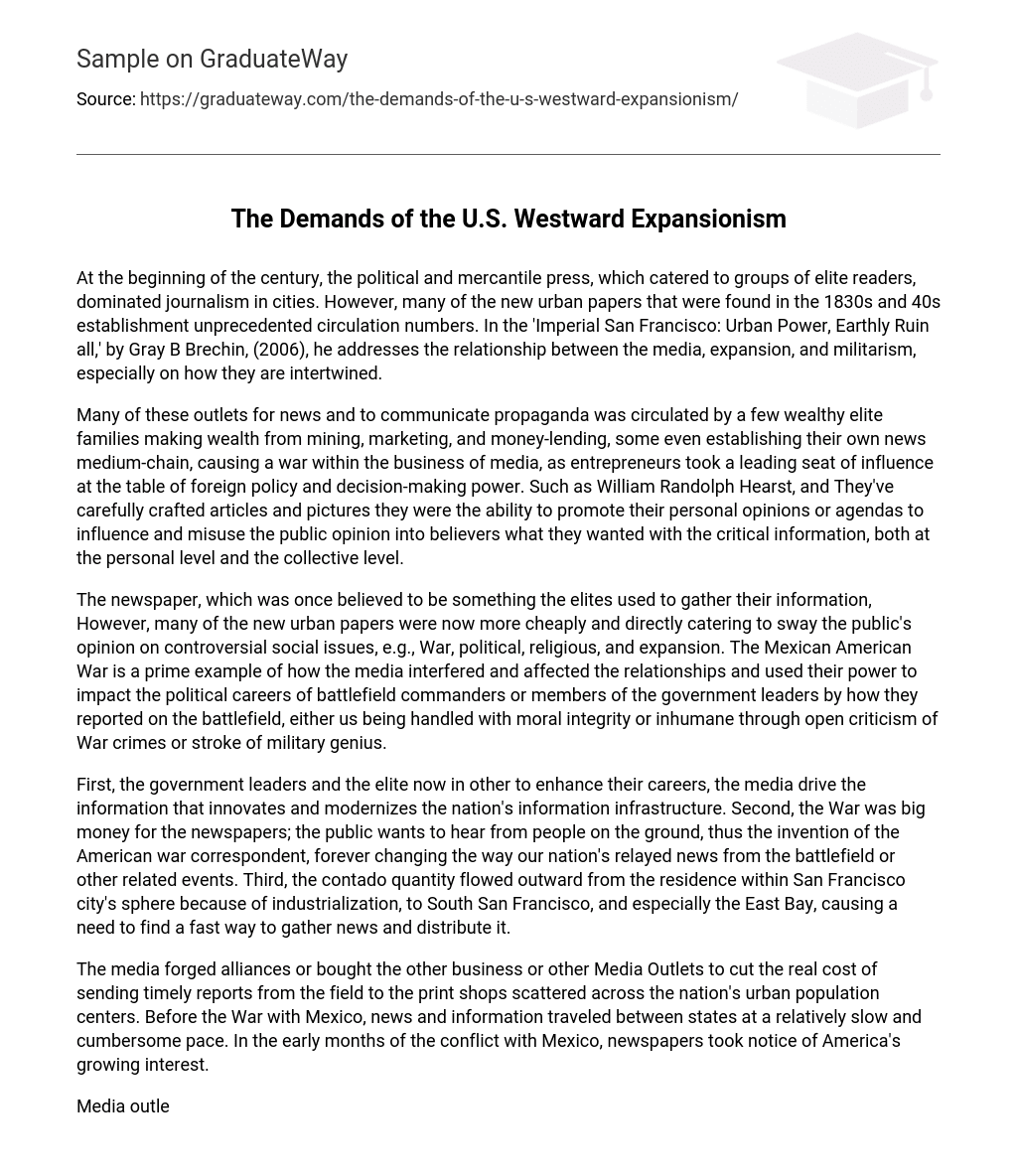At the beginning of the century, the political and mercantile press, which catered to groups of elite readers, dominated journalism in cities. However, many of the new urban papers that were found in the 1830s and 40s establishment unprecedented circulation numbers. In the ‘Imperial San Francisco: Urban Power, Earthly Ruin all,’ by Gray B Brechin, (2006), he addresses the relationship between the media, expansion, and militarism, especially on how they are intertwined.
Many of these outlets for news and to communicate propaganda was circulated by a few wealthy elite families making wealth from mining, marketing, and money-lending, some even establishing their own news medium-chain, causing a war within the business of media, as entrepreneurs took a leading seat of influence at the table of foreign policy and decision-making power. Such as William Randolph Hearst, and They’ve carefully crafted articles and pictures they were the ability to promote their personal opinions or agendas to influence and misuse the public opinion into believers what they wanted with the critical information, both at the personal level and the collective level.
The newspaper, which was once believed to be something the elites used to gather their information, However, many of the new urban papers were now more cheaply and directly catering to sway the public’s opinion on controversial social issues, e.g., War, political, religious, and expansion. The Mexican American War is a prime example of how the media interfered and affected the relationships and used their power to impact the political careers of battlefield commanders or members of the government leaders by how they reported on the battlefield, either us being handled with moral integrity or inhumane through open criticism of War crimes or stroke of military genius.
First, the government leaders and the elite now in other to enhance their careers, the media drive the information that innovates and modernizes the nation’s information infrastructure. Second, the War was big money for the newspapers; the public wants to hear from people on the ground, thus the invention of the American war correspondent, forever changing the way our nation’s relayed news from the battlefield or other related events. Third, the contado quantity flowed outward from the residence within San Francisco city’s sphere because of industrialization, to South San Francisco, and especially the East Bay, causing a need to find a fast way to gather news and distribute it.
The media forged alliances or bought the other business or other Media Outlets to cut the real cost of sending timely reports from the field to the print shops scattered across the nation’s urban population centers. Before the War with Mexico, news and information traveled between states at a relatively slow and cumbersome pace. In the early months of the conflict with Mexico, newspapers took notice of America’s growing interest.
Media outlets quickly developed strategies for providing fresh reports from the battlefield to an audience hungry for stories of adventure and conquer. Creative media entrepreneurs developed ingenious methods for sending news stories to the curious public at home by establishing message routes that linked vital cities across the nation through alliances with reports come in from commanders soldiers and police officers—using a fusion of technology and resources like the telegraph systems to speed delivery of news from the battlefield to the papers covering the war effort. Likewise, each of these levels of government needed newspapers, and the new American system of political parties also supported publications.
Nested within the revolutionary growth of American influence during this conflict are discrete changes in the interaction between the military and the media Understanding the power of public opinion. Noticeably it becomes clear early on that a few people with shared social backgrounds, and political outlooks made the critical decisions that determined America’s destiny with War, expansions Incidentally, July 1845 was also the month that writer John L. O’Sullivan coined the term ‘Manifest Destiny’ in his July-August 1845 issue of the United States Magazine and Democratic Review.
This The 19th-century phrase captured the spirit behind the public’s growing want to stretch the nation’s borders across the North American continent from the Atlantic to the Pacific. The massive expansion, combined with newly acquired resources and valuable trade routes, exponentially enhanced the nation’s economic power at the cost of its southern neighbor. In summary, the elite who ran the media Outlets affected the military and San Francisco’s involvement in the nation’s expansion in several critical ways.
First, the press enhanced Soldier morale, reported unsavory acts of soldiers, calling the leaders to enforce discipline in the field. Third, the news inspired volunteerism by joining the force in significant numbers and through their patriotic stories that reinforced a nationalistic pride. Fourth, the media affected the military by an opening discussion about operational security issues raised. Both organizations benefited from the War with Mexico, by selling their respective services to meet the demands of the U.S. Westward expansionism. Although the media’s relationship with the Seizing, the opportunities presented by the Mexican War, the media and military leaders built a cooperative relationship whose underlying foundation rested upon common goals and shared interests.





